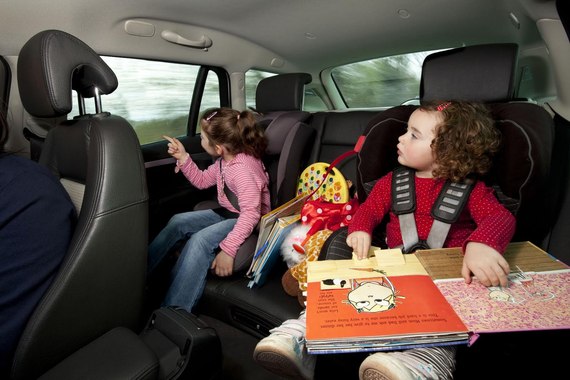 A long trip with your restless little ones can be a challenge to say the least.
A long trip with your restless little ones can be a challenge to say the least.
To get your holiday off to a great start for both you and the kids, try these simple travel games that will not only keep them entertained, but have their little minds ticking over for the rest of the journey.
1. I Spy
This easy-to-learn game is perfect for preschoolers, and can keep them entertained for a surprisingly long time. The directions are simple: One person spies something and recites the line, ending in a clue. Everyone else takes turns trying to guess the mystery item.
2. Road Trip Bingo
This fun game combines bingo with a scavenger hunt. Give each child a flat surface, such as a clipboard or hardcover book, to put on his or her lap. Each player gets a bingo card - which they can help you make at home before you set off - and a crayon. When a player spies an item on his card, he or she ticks it off. Just like in bingo, the first player to cover all the squares in a straight line wins.
3. X and Os
All you need are two players and a pencil to play this popular standby. Player One places an X on the grid, Player Two plots an O. They continue to take turns until one player has three across.
4. I’m Going on a Picnic
This alphabet-based memory game is great for kids aged five and up. You don’t need a game board or any materials. The game can be played with as few as two players, but it’s more fun when the whole family joins in. The first player says “I’m going on a picnic and I’m bringing...” followed by something that begins with A, such as apples. The second player repeats what the first person said, but adds something that begins with B. So she might say “I’m going on a picnic and I’m bringing apples and bananas.” And so on with C, D, and the rest of the alphabet. If someone forgets an item, they're out. The last player to be able to recite all the items on the list wins.
5. 20 Questions
This easy-peasy game is great for younger kids, thanks to its straightforward rules. Player One thinks of a person, place or thing. Everyone else takes turns asking questions that can be answered with a simple yes or no. After each answer, the questioner gets one guess. Play continues until a player guesses correctly.
6. Name That Tune
Here's a game that's great for those who like to sing or hum a tune. One player thinks of a song that everybody knows and hums its first few notes. The other players try to guess the name of the song. If they can't guess, the first player keeps humming more notes in the song until someone comes up with the right answer. There are no winners or losers in this game; it ends when everyone gets tired of it.
7. The Preacher’s Cat
Here’s another alphabet-based memory game for school-age kids. The game centres around a sentence in which only two words change. To play, each player constructs the same sentence around a letter of the alphabet. Starting with A, the first player might say “The preacher’s cat is a lovely cat named Amy.” The second player replaces the two underlined words with others starting with A, such as, “The preacher’s cat is an adorable cat named Albert.” If a player can’t think of a new word, or if he or she repeats a word, they're out. The play continues with B, C, D, and so on, until there is one remaining player.
8. Spot the Car
For families with tween and teen car fans, this scavenger hunt should keep them occupied for the whole journey. Get them to jot down, and shout out every new model of car they spot. The player with the most models at the end of the journey, wins. There can be bonus marks for the most recent year, and make.
9. I'm Thinking of an Animal
One player thinks of an animal. The other tries to guess which animal it is by asking no more than ten "yes" or "no" questions. If he guesses correctly in ten questions or fewer, he gets to think of the next animal. If not, the first player reveals the answer and then thinks of another animal. No one really wins, and the game is over when the children don't want to play anymore.
10. Impressions
Players take turns imitating people known to all the other participants. These can be famous actors, television characters, or even the loud next-door neighbour. The players can't say whom they're mimicking or give hints; they rely only on their acting ability. The first person to guess who's being imitated gets a point. The first person to get however many points the group decides is the goal, wins.
Image via Pinterest.








